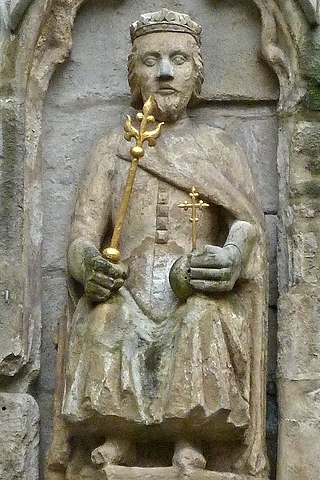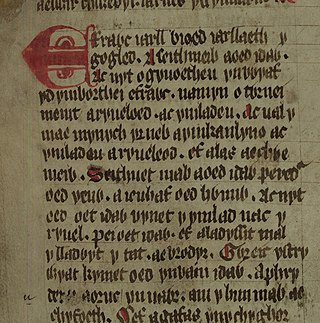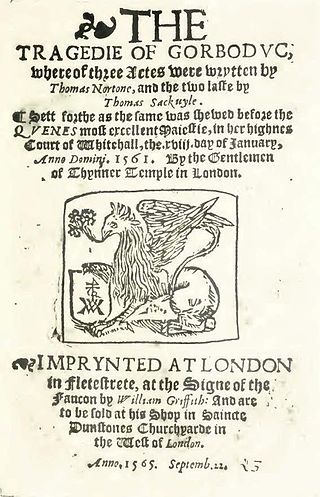Notes
- ↑ John Allen Giles (1842). The British History of Geoffrey of Monmouth: In Twelve Books. J. Bohn. p. 39.
Ferrex was the son of the legendary king Gorboduc of the Britons, and fought with his brother Porrex for the throne, according to Geoffrey of Monmouth. [1]
When his father had become old, he quarrelled with his brother Porrex over who would succeed to the kingship. Ferrex discovered that Porrex planned to kill him, and fled to Gaul, where he enlisted the help of Suhard, the king of the Franks. Upon his return, he fought a battle with his brother and died there. The Gaulish army was also destroyed.
Ferrex had been his mother Judon's favourite son, and she avenged his death by killing Porrex in his sleep. This led to a long civil war between five kings in Britain.
Ferrex was a central character in Thomas Norton and Thomas Sackville's play Gorboduc (1561).

Uther Pendragon (Brittonic), also known as King Uther, was a legendary King of the Britons and father of King Arthur.
Marganus was a legendary king of the Britons as accounted by Geoffrey of Monmouth. He came to power in 850BC.
Cunedagius was a legendary king of the Britons, as recounted by Geoffrey of Monmouth. He came to power in 850BC.
Kimarcus was a legendary king of the Britons according to Geoffrey of Monmouth. He was the son of Sisillius I. and was succeeded by Gorboduc. Geoffrey has nothing to say of him beyond this.

Gorboduc was a legendary king of the Britons as recounted by Geoffrey of Monmouth. He was married to Judon. When he became old, his sons, Ferrex and Porrex, feuded over who would take over the kingdom. Porrex tried to kill his brother in an ambush, but Ferrex escaped to France. With the French king Suhardus, he invaded Britain, but was defeated and killed by Porrex. Porrex was killed in revenge by his own mother Judon, then the high strata of society killed his mother and then there was a war between high strata and low strata leading to an anarchy in the society. This anarchy led to civil war denouncing Gorboduc. Geoffrey does not state when Gorbuduc died, but he is not mentioned after the account of the strife between his sons.
Porrex I was a legendary king of the Britons as accounted by Geoffrey of Monmouth. He was the son of Gorboduc and his death began a dynastic civil war.
Dyfnwal Moelmud was accounted as an early king and lawmaker among the Welsh, credited with the codification of their standard units of measure. He also figures as a legendary king of the Britons in Geoffrey of Monmouth's pseudohistorical History of the Kings of the Britons.

Belinus the Great was a legendary king of the Britons, as recounted by Geoffrey of Monmouth. He was the son of Dunvallo Molmutius and brother of Brennius and came to power in 390 BC. He was probably named after the ancient god Belenus.
Catellus was a legendary king of the Britons, as recounted in Geoffrey of Monmouth's work Historia Regum Britanniae. He came to power in 269 BC.
Millus was a legendary king of the Britons as recounted by Geoffrey of Monmouth. His father was King Catellus and was succeeded by his son, Porrex II.
Porrex II was a legendary king of the Britons as recounted in Geoffrey of Monmouth's Historia Regum Britanniae. He came to power in 257 BC.
Cherin was a legendary king of the Britons as recounted in Geoffrey of Monmouth's Historia Regum Britanniae. He came to power in 251 BC.
Nennius is a mythical prince of Britain at the time of Julius Caesar's invasions of Britain. His story appears in Geoffrey of Monmouth's History of the Kings of Britain (1136), a work whose contents are now considered largely fictional. In Middle Welsh versions of Geoffrey's Historia he was called Nynniaw.

Historia regum Britanniae, originally called De gestis Britonum, is a pseudohistorical account of British history, written around 1136 by Geoffrey of Monmouth. It chronicles the lives of the kings of the Britons over the course of two thousand years, beginning with the Trojans founding the British nation and continuing until the Anglo-Saxons assumed control of much of Britain around the 7th century. It is one of the central pieces of the Matter of Britain.
Thomas Norton was an English lawyer, politician, writer of verse, and playwright.

Peredur is the name of a number of men from the boundaries of history and legend in sub-Roman Britain. The Peredur who is most familiar to a modern audience is the character who made his entrance as a knight in the Arthurian world of Middle Welsh prose literature.

The Tragedie of Gorboduc, also titled Ferrex and Porrex, is an English play from 1561. It was first performed at the Christmas celebration given by the Inner Temple in 1561, and performed at Whitehall before Queen Elizabeth I on 18 January 1561, by the Gentlemen of the Inner Temple. The authors were Thomas Norton and Thomas Sackville, said to be responsible for the first three acts, and the final two, respectively.

Lucy Toulmin Smith (1838–1911) was an Anglo-American antiquarian and librarian, known for her first publication of the York Mystery Plays and other early works.

Goffar known as Goffar the Pict, was a pseudo-historical king of Aquitaine around the year 1000 BCE in Geoffrey of Monmouth's Historia Regum Britanniae. In the story, he was defeated by Brutus of Troy and Corineus on their way to Britain. Later histories of Britain and France included Goffar from Historia Regum Britanniae, and sometimes expanded the story with additional details.
John Higgins was an English cleric, poet and linguist. He is now best known as a contributor to the Mirror for Magistrates series of poetry collections.